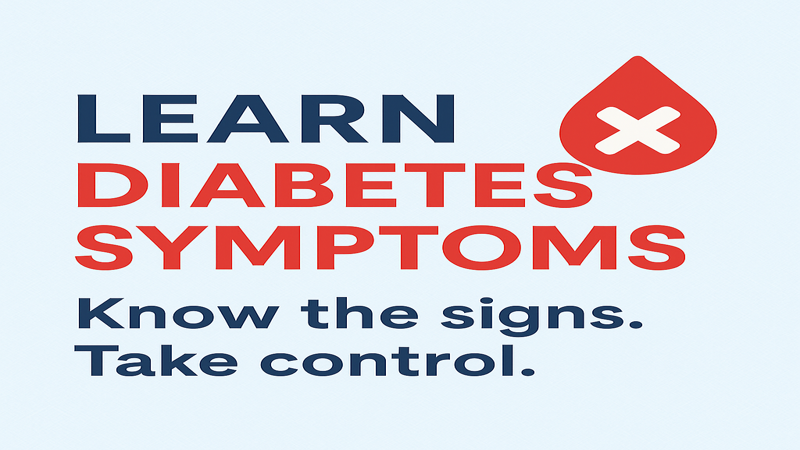Diabetes is a silent predator. It creeps up slowly, often without obvious warning signs—until one day, your body starts sending distress signals. The problem? Many people ignore these early symptoms, brushing them off as stress, aging, or just “one of those days.”
But here’s the truth: catching diabetes early can save your life.
Whether you’re at risk, worried about a loved one, or just want to stay informed, this guide will walk you through the key early signs of diabetes—so you can take action before it’s too late.
Why Early Detection Matters
Before we dive into symptoms, let’s talk about why recognizing them early is a game-changer.
-
Prevent irreversible damage – Uncontrolled diabetes can lead to nerve damage, blindness, kidney failure, and even amputations.
-
Avoid life-threatening complications – Heart disease, strokes, and severe infections are far more common in diabetics.
-
Take back control – Early intervention (through diet, lifestyle, or medication) can reverse prediabetes and manage full-blown diabetes effectively.
Bottom line? The sooner you spot the signs, the better your chances of staying healthy.
The Most Common Early Symptoms of Diabetes
Diabetes symptoms can vary between Type 1 (usually sudden onset) and Type 2 (develops gradually). But here are the red flags you should never ignore:
1. Extreme Thirst & Frequent Urination (The Classic Combo)
-
Why it happens: Excess sugar in your blood forces your kidneys to work overtime, pulling fluids from your tissues and making you pee constantly.
-
What to watch for:
-
Drinking gallons of water but still feeling parched.
-
Waking up multiple times at night to urinate.
-
2. Unrelenting Fatigue (Even After Sleeping)
-
Why it happens: Your cells aren’t getting enough glucose (energy), leaving you drained no matter how much you rest.
-
What to watch for:
-
Feeling exhausted after normal activities (like walking upstairs).
-
Midday crashes where you need a nap to function.
-
3. Sudden Weight Changes (Gain or Loss)
-
Type 1 diabetes: Rapid, unexplained weight loss (because your body burns fat/muscle for energy).
-
Type 2 diabetes: Stubborn weight gain (especially around the belly) due to insulin resistance.
4. Blurry Vision (Like Looking Through a Foggy Window)
-
Why it happens: High blood sugar swells the lenses in your eyes, distorting vision.
-
The scary part: If ignored, this can lead to permanent blindness.
5. Slow-Healing Cuts & Frequent Infections
-
Why it happens: High sugar levels weaken your immune system and reduce blood flow.
-
What to watch for:
-
Cuts/bruises that take weeks to heal.
-
Recurring yeast infections, UTIs, or gum disease.
-
6. Tingling or Numbness in Hands/Feet (Early Nerve Damage)
-
Why it happens: Excess glucose damages nerves, starting with the extremities.
-
What to watch for:
-
A “pins and needles” sensation.
-
Burning or sharp pains in feet (especially at night).
-
7. Intense Hunger (Even After Eating)
-
Why it happens: Without enough insulin, your body can’t convert food into energy—so it keeps demanding more fuel.
-
What to watch for:
-
Ravenous hunger shortly after meals.
-
Cravings for sugar/carbs (a vicious cycle).
-
“But I Feel Fine!” – The Danger of Ignoring Mild Symptoms
Here’s the scary part: Many people with early diabetes have no obvious symptoms. Or they dismiss them as:
-
“I’m just getting older.”
-
“I’ve been stressed lately.”
-
“Maybe I’m not sleeping well.”
But diabetes doesn’t care about excuses. By the time symptoms get severe, damage may already be done.
Who’s Most at Risk? (Should You Be Worried?)
While anyone can develop diabetes, you’re at higher risk if you:
✅ Are overweight (especially with belly fat).
✅ Have a family history of diabetes.
✅ Are over 45.
✅ Had gestational diabetes during pregnancy.
✅ Live a sedentary lifestyle.
✅ Eat a high-sugar, processed-food diet.
If any of these apply, get tested—even if you feel fine.
What to Do Next: How to Confirm & Take Action
Step 1: Get Tested (It’s Simple!)
-
Fasting blood sugar test (Normal: <100 mg/dL | Prediabetes: 100-125 | Diabetes: 126+)
-
A1C test (Measures 3-month average blood sugar).
-
At-home glucose monitors (For regular tracking).
Step 2: Take Control Early
If caught in the prediabetes stage, you can often reverse it with:
-
A low-sugar, whole-foods diet.
-
Regular exercise (even walking helps).
-
Supplements like berberine or cinnamon (studies show they help balance blood sugar).
If diagnosed with diabetes, work with your doctor—but know that it’s manageable with the right lifestyle changes.
Final Warning: Don’t Wait Until It’s Too Late
Diabetes is stealthy, but you’re not defenseless. If you (or someone you love) are experiencing even one or two of these symptoms, get checked NOW.
Ignoring the signs won’t make them disappear—it just gives diabetes more time to wreak havoc on your body.
Your health is worth fighting for. Take the first step today.
P.S. If you’re looking for a natural way to support healthy blood sugar levels, check out Gluco Extend—a science-backed formula designed to help balance glucose levels and boost energy. Try it risk-free today! 🚀
👉 Click Here to Learn More About Gluco Extend



Leave a Reply